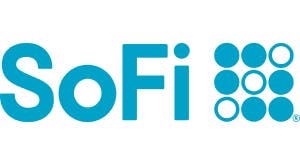SoFi undergraduate student loan disclosure
Interest Rates: Eligibility and Important Details. Fixed rates range from 3.43% APR to 15.99% APR with 0.25% autopay discount. Variable rates range from 4.64% APR to
15.99% APR with a 0.25% autopay discount. Unless required to be lower to comply with applicable law, Variable Interest rates are capped at 17.95%. SoFi rate ranges are
current as of 1/28/2026 and are subject to change at any time. Your actual rate will be within the range of rates listed above and will depend on the term and type of
repayment option you select, evaluation of your creditworthiness, income, presence of a co-signer (if applicable) and a variety of other factors. Lowest rates reserved for
the most creditworthy borrowers. Check out our eligibility criteria at https://www.sofi.com/eligibility-criteria/. For the SoFi variable-rate product, the variable interest
rate for a given month is derived by adding a margin to the 30-day average SOFR index, published two business days preceding such calendar month, rounded up to the
nearest one hundredth of one percent (0.01% or 0.0001). APRs for variable-rate loans may increase after origination if the SOFR index increases.
Autopay Discount: The SoFi 0.25% autopay interest rate reduction requires you to agree to make monthly payments as outlined in your loan agreement by an automatic
monthly deduction from a savings or checking account. This benefit will discontinue and be lost for periods in which you do not pay by automatic deduction from a
savings or checking account. When the autopay interest rate deduction is added or removed, the next time the loan is re-amortized (quarterly for fixed rate loans;
monthly for variable rate loans),the principal balance of your loan will be spread over the remaining loan term, and your monthly payment amount will change. This
benefit is suspended during periods of deferment, grace period, or forbearance. Autopay is not required to receive a loan from SoFi.
Please borrow responsibly. SoFi Private Student loans are not a substitute for federal loans, grants, and work-study programs. We encourage you to evaluate all your federal student aid options before you
consider any private loans, including ours. Read our FAQs.
Terms and Conditions Apply. SOFI RESERVES THE RIGHT TO MODIFY OR DISCONTINUE PRODUCTS AND BENEFITS AT ANY TIME WITHOUT NOTICE. SoFi Private Student loans are subject to program terms and
restrictions, such as completion of a loan application and self-certification form, verification of application information, the student's at least half-time enrollment in a degree program at a SoFi-participating
school, and, if applicable, a co-signer. In addition, borrowers must be U.S. citizens or other eligible status, be residing in the U.S., Puerto Rico, U.S. Virgin Islands, or American Samoa, and must meet SoFi’s
underwriting requirements, including verification of sufficient income to support your ability to repay. Minimum loan amount is $1,000. See SoFi.com/eligibility for more information. View payment examples.
Lowest rates reserved for the most creditworthy borrowers. SoFi reserves the right to modify eligibility criteria at any time. This information is current as of 6/9/2025 and is subject to change. SoFi Private Student
loans are originated by SoFi Bank, N.A. Member FDIC. NMLS #696891. (www.nmlsconsumeraccess.org)
SoFi student loan refinancing disclosure
Fixed rates range from 4.24% APR to 9.99% APR with 0.25% autopay discount and 0.125% SoFi Plus discount. Variable rates range from 5.99% APR to 9.99% APR with 0.25% autopay discount and 0.125% SoFi Plus discount. Unless required to be lower to comply with
applicable law, Variable Interest rates will never exceed 13.95% (the maximum rate for these loans). SoFi rate ranges are current as of 12/10/25 and are subject to change at any time. Your actual rate will be within the range of rates listed above and will depend on
the term you select, evaluation of your creditworthiness, income, presence of a co-signer and a variety of other factors. Lowest rates reserved for the most creditworthy borrowers. For the SoFi variable-rate product, the variable interest rate for a given month is
derived by adding a margin to the 30-day average SOFR index, published two business days preceding such calendar month, rounded up to the nearest one hundredth of one percent (0.01% or 0.0001). APRs for variable-rate loans may increase after origination if the
SOFR index increases. You may pay more interest over the life of the loan if you refinance with an extended term.
Autopay Discount: The SoFi 0.25% autopay interest rate reduction requires you to agree to make monthly payments as outlined in your loan agreement by an automatic monthly deduction from a savings or checking account. This benefit will discontinue and be lost
for periods in which you do not pay by automatic deduction from a savings or checking account. When the autopay interest rate deduction is added or removed, the next time the loan is re-amortized (quarterly for fixed rate loans; monthly for variable rate
loans),the principal balance of your loan will be spread over the remaining loan term, and your monthly payment amount will change. This benefit is suspended during periods of deferment, grace period, or forbearance. Autopay is not required to receive a loan
from SoFi.
SoFi Plus Discount: To be eligible to receive an additional (0.125%) interest rate reduction on your Student Loan Refinancing (your "Loan") for enrolling in SoFi Plus, you must enroll in SoFi Plus within 30 days of Loan funding, either by receiving an Eligible Direct
Deposit to your SoFi Checking and Savings account, or by paying the SoFi Plus Subscription Fee. Once eligible, you will receive this discount during periods in which you have received Eligible Direct Deposit to your SoFi Checking and Savings Account, or during periods
in which SoFi successfully receives payment of the SoFi Plus Subscription Fee. This discount lowers your interest rate but does not change the amount of your regular monthly payment. This discount will be removed during periods in which SoFi determines you have
turned off Eligible Direct Deposit to your Checking and Savings account or in which you have not paid the SoFi Plus Subscription Fee. SoFi reserves the right to change or terminate this interest rate reduction offer for unenrolled participants at any time without
notice. You are not required to enroll in Eligible Direct Deposit or to pay the SoFi Plus Subscription Fee to be eligible for Loan approval.
Eligible Direct Deposit means a recurring deposit of regular income to an account holder’s SoFi Checking or Savings account, including payroll, pension, or government benefit payments (e.g., Social Security), made by the account holder’s employer, payroll or
benefits provider or government agency (“Eligible Direct Deposit”) via the Automated Clearing House (“ACH”) Network during a 30-Day Evaluation Period (as defined below). Although we do our best to recognize all Eligible Direct Deposits, a small number of
employers, payroll providers, benefits providers, or government agencies do not designate payments as direct deposit. To ensure you’re receiving the Student Loan Refinance discount, we encourage you to check your SoFi Plus status in the Membership & Rewards
Center the day after your Eligible Direct Deposit arrives. If your SoFi Plus status is not reflected in the Membership & Rewards Center, contact us at 855-456-7634 with the details of your Eligible Direct Deposit. As long as SoFi Bank can validate those details, you will
start receiving the Student Loan Refinance discount from the date you contact SoFi for the rest of the current 30-Day Evaluation Period. You will also be eligible for the Student Loan Refinance discount on future Eligible Direct Deposits, as long as SoFi Bank can
validate them. Deposits that are not from an employer, payroll or benefits provider, or government agency, including but not limited to check deposits, peer-to-peer transfers (e.g., transfers from PayPal, Venmo, etc.), merchant transactions (e.g., transactions from
PayPal, Stripe, Square, etc.), and bank ACH funds transfers and wire transfers from external accounts, or are non-recurring in nature (e.g., IRS tax refunds), do not constitute Eligible Direct Deposit activity. SoFi Bank shall, in its sole discretion, assess each account
holder’s Eligible Direct Deposit activity to determine eligibility and may require additional documentation to complete this verification. The 30-Day Evaluation Period refers to the “Start Date” and “End Date” set forth on the APY Details page of your account, which
comprises a period of 30 calendar days (the “30-Day Evaluation Period”). You can access the APY Details page at any time by logging into your SoFi account on the SoFi mobile app or SoFi website and selecting either (i) Banking > Savings > Current APY or (ii) Banking
> Checking > Current APY. SoFi Plus member benefits will be lost during periods in which the customer has turned off Eligible Direct Deposit into their account. If you are a joint account holder of a SoFi Checking and Savings account and either you or your joint
account holder receives Eligible Direct Deposit into your SoFi Checking and Savings account, then you will be eligible for all SoFi Plus benefits, including on accounts you hold in your own name.
Terms and conditions apply. SoFi Refinance Student Loans are private loans. When you refinance federal loans with a SoFi loan, YOU FOREFEIT YOUR EILIGIBILITY FOR ALL FEDERAL LOAN BENEFITS, including all flexible federal
repayment and forgiveness options that are or may become available to federal student loan borrowers including, but not limited to: Public Service Loan Forgiveness (PSLF), Income-Based Repayment, Income-Contingent Repayment,
extended repayment plans, PAYE or SAVE. Lowest rates reserved for the most creditworthy borrowers. Learn more at SoFi.com/eligiblity. SoFi Refinance Student Loans are originated by SoFi Bank, N.A. Member FDIC. NMLS #696891
(www.nmlsconsumeraccess.org).
































